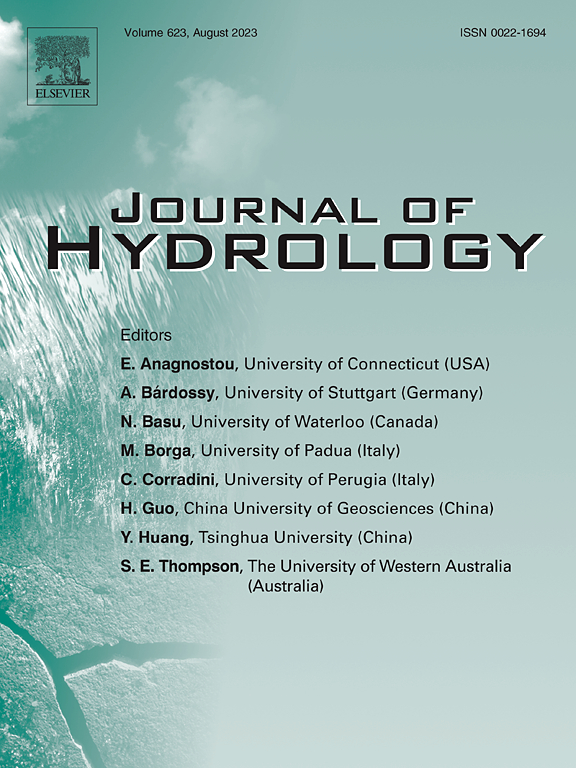估计气候变化下设计洪水相对变化的不确定性:基于过程、深度学习和混合模型的程式化实验
IF 6.3
1区 地球科学
Q1 ENGINEERING, CIVIL
引用次数: 0
摘要
水系统对未来水文的恢复能力取决于对水文变化的可靠预测。基于过程的水文模型以及最近的基于机器学习的水文模型通常用于此类预测。为了考虑模型的不确定性,水文学家经常报告水文设计统计数据的相对(即百分比)变化,而不是绝对值,假设模型偏差在估计相对变化时被抵消。虽然广泛的研究已经解决了水文建模中的不确定性量化问题,但很少有工作研究相对变化估计中的不确定性及其与结构、参数和输入不确定性的关系。在这项研究中,我们在美国马萨诸塞州的30个流域进行了一项程式化的实验,以评估六种水文模型的设计洪水变化估计的不确定性:三种不同复杂性的基于过程的模型,一种深度学习模型,以及两种将过程模型与深度学习后处理器相结合的混合模型。我们评估了每个模型在不同气候情景和历史降水误差水平下预测设计洪水变化的能力,并将其与另一个模型作为真实水文系统进行比较。我们的研究结果显示,即使没有历史降水误差,估计的设计洪水变化也存在相当大的差异和一些偏差。不确定性仅随降水误差的增加而轻微增加,表明结构限制和等定性主导了不确定性。深度学习模型提供了变化的竞争性估计,而深度学习后处理器通常会减少偏差,但不会减少变化估计的方差。跨站点的设计洪水变化汇总估计显著减少了误差方差,提高了可靠性。总的来说,这些见解可以指导水文变化评估的模型和方法选择,以支持长期规划。本文章由计算机程序翻译,如有差异,请以英文原文为准。
Uncertainty in estimating the relative change of design floods under climate change: a stylized experiment with process-based, deep learning, and hybrid models
The resilience of water systems to future hydrology depends on reliable projections of hydrological change. Process-based and, more recently, machine learning-based hydrological models are commonly used for such projections. To account for model uncertainties, hydrologists often report relative (i.e., percent) changes in hydrologic design statistics rather than absolute values, assuming model biases cancel out when estimating relative change. While extensive research has addressed uncertainty quantification in hydrologic modeling, little work has examined uncertainty in relative change estimates and its relationship to structural, parametric, and input uncertainties. In this study, we conduct a stylized experiment across 30 basins in Massachusetts, USA to evaluate uncertainty in design flood change estimates from six hydrological models: three process-based models of varying complexity, a deep learning model, and two hybrid models combining process models with deep learning post-processors. We assess each model’s ability to predict changes in design floods under different climate scenarios and levels of historical precipitation error, compared to another model taken as the true hydrologic system. Our findings reveal considerable variance and some bias in estimated design flood change, even with no historical precipitation error. Uncertainty increases only marginally with more precipitation error, suggesting structural limitations and equifinality dominate uncertainty. The deep learning model provides competitive estimates of change, while deep learning post-processors generally reduce bias but not variance of change estimates. Pooling estimates of design flood change across sites significantly reduces error variance, improving reliability. Overall, these insights can guide model and methodological choices for hydrological change assessments supporting long-term planning.
求助全文
通过发布文献求助,成功后即可免费获取论文全文。
去求助
来源期刊

Journal of Hydrology
地学-地球科学综合
CiteScore
11.00
自引率
12.50%
发文量
1309
审稿时长
7.5 months
期刊介绍:
The Journal of Hydrology publishes original research papers and comprehensive reviews in all the subfields of the hydrological sciences including water based management and policy issues that impact on economics and society. These comprise, but are not limited to the physical, chemical, biogeochemical, stochastic and systems aspects of surface and groundwater hydrology, hydrometeorology and hydrogeology. Relevant topics incorporating the insights and methodologies of disciplines such as climatology, water resource systems, hydraulics, agrohydrology, geomorphology, soil science, instrumentation and remote sensing, civil and environmental engineering are included. Social science perspectives on hydrological problems such as resource and ecological economics, environmental sociology, psychology and behavioural science, management and policy analysis are also invited. Multi-and interdisciplinary analyses of hydrological problems are within scope. The science published in the Journal of Hydrology is relevant to catchment scales rather than exclusively to a local scale or site.
 求助内容:
求助内容: 应助结果提醒方式:
应助结果提醒方式:


